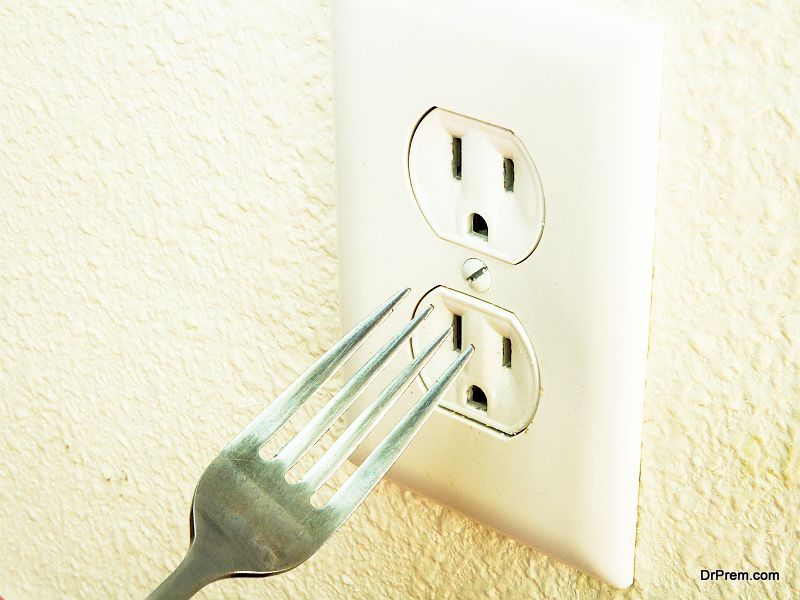Educating children about electrical safety is vital in creating a safe and secure home environment and preventing potential and unexpected mishaps.
This article provides essential knowledge on electrical safety tips for kids, which will allow them to identify and avoid dangerous situations, teaching them, in turn, to be more self-reliant and independent.
By incorporating these practices, the upbringing of your little ones and promoting a strong understanding of electrical safety, you can ensure that your home is safe for your kids to learn and grow.
Teaching them about these risks not only helps protect them but also contributes to fostering a culture of safety within the family.
Keep Metal Objects Away from Electrical Appliances
Emphasising the importance of keeping metal objects away from electrical appliances is a fundamental aspect of electrical safety education for children.
Since metal is a great conductor of electricity, coming into contact with live electrical components while holding a metal object can result in serious electrical shocks or even get permanent body injuries and start fires.
Educating your kids not to insert metallic items like keys, cutlery, or nails into electrical appliances, sockets, or any other electrical devices is essential.
Teaching them about the potential dangers associated with the interaction of metal and electricity willsignificantly reduce the risk of accidents occurring in your household and also make them more self-reliant, which, in turn,helps you minimise your own fears as a parent.
Protect Plug Sockets
Securing plug sockets is another critical aspect of electrical safety for kids in your home.
Curious children may be tempted to insert objects or their fingers into electrical outlets, which can lead to severe injuries. To minimise this risk, ensure all electrical sockets are equipped with socket covers that prevent children from accessing them.
Periodically inspect these covers to confirm they are securely fitted and haven’t become loose or damaged. If necessary, replace any socket covers that no longer provide adequate protection.
This is one of the most important steps in reducing the likelihood of electrical accidents and the well-being of your children, especially when they are at a very young age and still curiously discovering the world by interacting and touching everything around them.
Keep Water and Drinks Away from Electrical Appliances
Educating your children about the hazards associated with mixing water and electricity is essential.
Ensure they understand the importance of keeping water and drinks safe from electrical appliances, sockets, and cords.
This precaution involves not touching electrical devices with wet hands and ensuring that beverages are not placed near computers, televisions, or any other appliances.
By teaching your children these safety measures, you help them develop an awareness of potential dangers and establish good habits that can prevent electrical accidents in the home.
Encourage open communication and provide opportunities for them to ask questions, fostering a better understanding of electrical safety.
Repair Broken Electrical Wires and Light Bulbs
Addressing broken electrical wires and light bulbs is very important in ensuring a safe environment for your children.
Regular home inspections should be conducted to identify any damaged or exposed wires, whether from an electrical appliance, extension cords and whatnot, which must be promptly repaired or replaced to eliminate potential hazards.
Likewise, replacing any shattered light bulbs and educating your children about the risks associated with touching broken glass or attempting to change a light bulb without proper supervision is important.
Be sure to diligently maintain your home’s electrical system and create a good understanding of these dangers among your children to reduce the likelihood of accidents significantly.
Avoid Leaving Devices Plugged in at Night
Encouraging your children to unplug devices at night is an effective way to minimise the risk of unwanted accidents and save energy. Before bedtime, it is essential to teach them to switch off and unplug electrical devices, such as chargers, gaming consoles, and televisions.
Adopting this practice creates a sense of responsibility regarding electrical safety for kids and instils valuable energy-saving habits that can positively impact the environment and your energy bills in the long run.
Never Overload an Electrical Adapter
Another vital thing to teach children is about the hazards of overloading electrical adapters, as this can result in overheating and, in some cases, even fires.
Help them understand that using only one plug per socket is a good rule of thumb, and emphasise the importance of not creating makeshift solutions when they need additional outlets.
Instead, encourage them to seek assistance from an adult to find a safe and appropriate solution.
Avoid Letting Leads from Electrical Items Across the Floor
Another important safety measure is instructing children to avoid letting leads from electrical items run across the floor. These leads can create tripping hazards and increase the likelihood of wires getting damaged, which in turn can lead to electrocution and injuries.
Teach your children the importance of keeping leads organised and not running them across walkways or areas with high foot traffic. Introduce them to cable organisers or clips that can be used to keep cords tidy and out of harm’s way.
Never Put Candles on Top of Electrical Appliances
Candles near or on electrical devices, such as televisions, computers or microwaves, can pose a significant fire hazard. Ensure your children understand the importance of keeping candles away from these appliances, and always supervise their use of open flames.
As a safer alternative, introduce them to flameless LED candles, which can provide a similar ambience without the associated risks. By instilling this awareness in your children, you are creating a safer home environment for them to grow in.
Child-Proof Your Home
Child-proofing your home is vital to creating a safe environment for your children while they grow and learn about the world.
As a parent, you should consider implementing various measures to mitigate potential hazards in your living space.
Start by installing safety gates to block off areas that may contain electrical dangers, such as utility rooms or workshops. Opt for cordless window coverings to eliminate the risk of strangulation from dangling cords.
Additionally, secure heavy furniture, such as bookshelves and television stands, to the walls to prevent them from toppling over and causing injuries. Place electrical appliances and tools out of reach of young children, and store them in locked cabinets when not used.
You may also want to install ground-fault circuit interrupter (GFCI) outlets in areas where water and electricity are in close proximity, such as bathrooms and kitchens, to help prevent electrical shocks.
Regularly inspect your home for potential electrical hazards, and consider scheduling periodic electrical safety inspections with a qualified electrician. They can provide professional electrical services, identifying and addressing any issues that could pose a risk to your children.
Conclusion
Educating your children on the basics of electrical safety allows them to recognise and avoid the potential dangers in the household. Implementing these tips and having open communication about electrical safety can create a safer environment for your entire family.
Remember, your vigilance in ensuring your children understand these safety guidelines is crucial to their well-being.
If you ever encounter an electrical issue you’re unsure about, don’t hesitate to consult a professional electrician who can provide expert electrical services.
By taking these steps, you can feel confident that your home is a secure and electrically safe place, allowing your children to learn and grow in a safe environment.
Article Submitted By Community Writer




